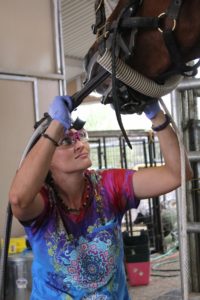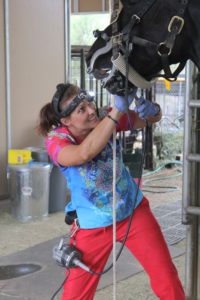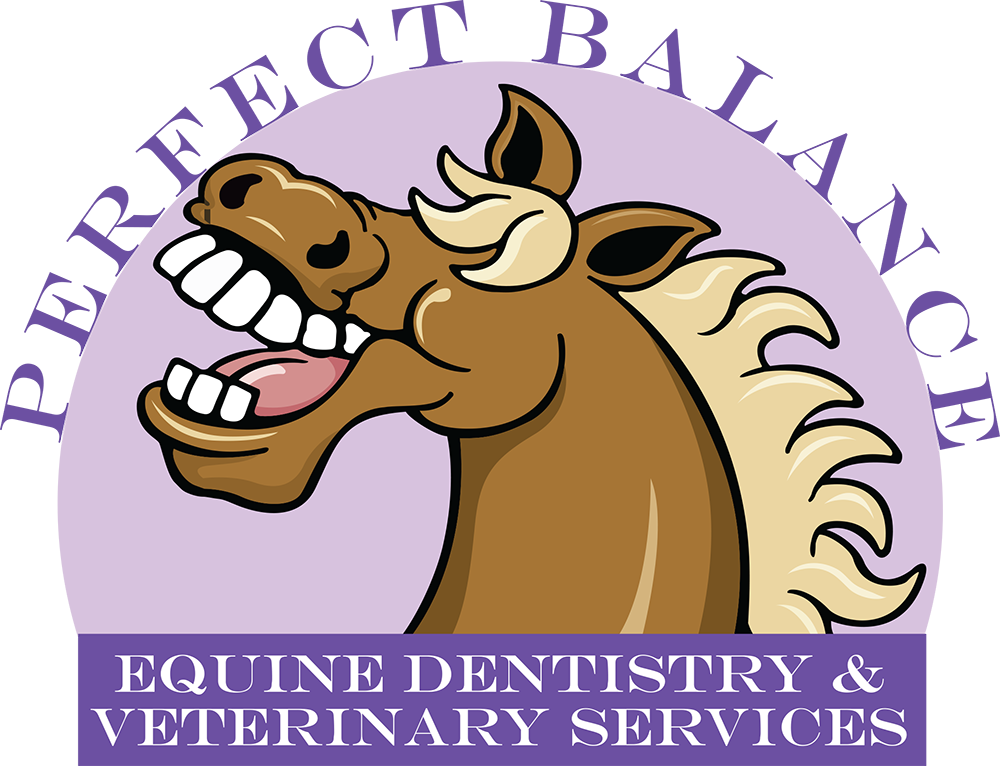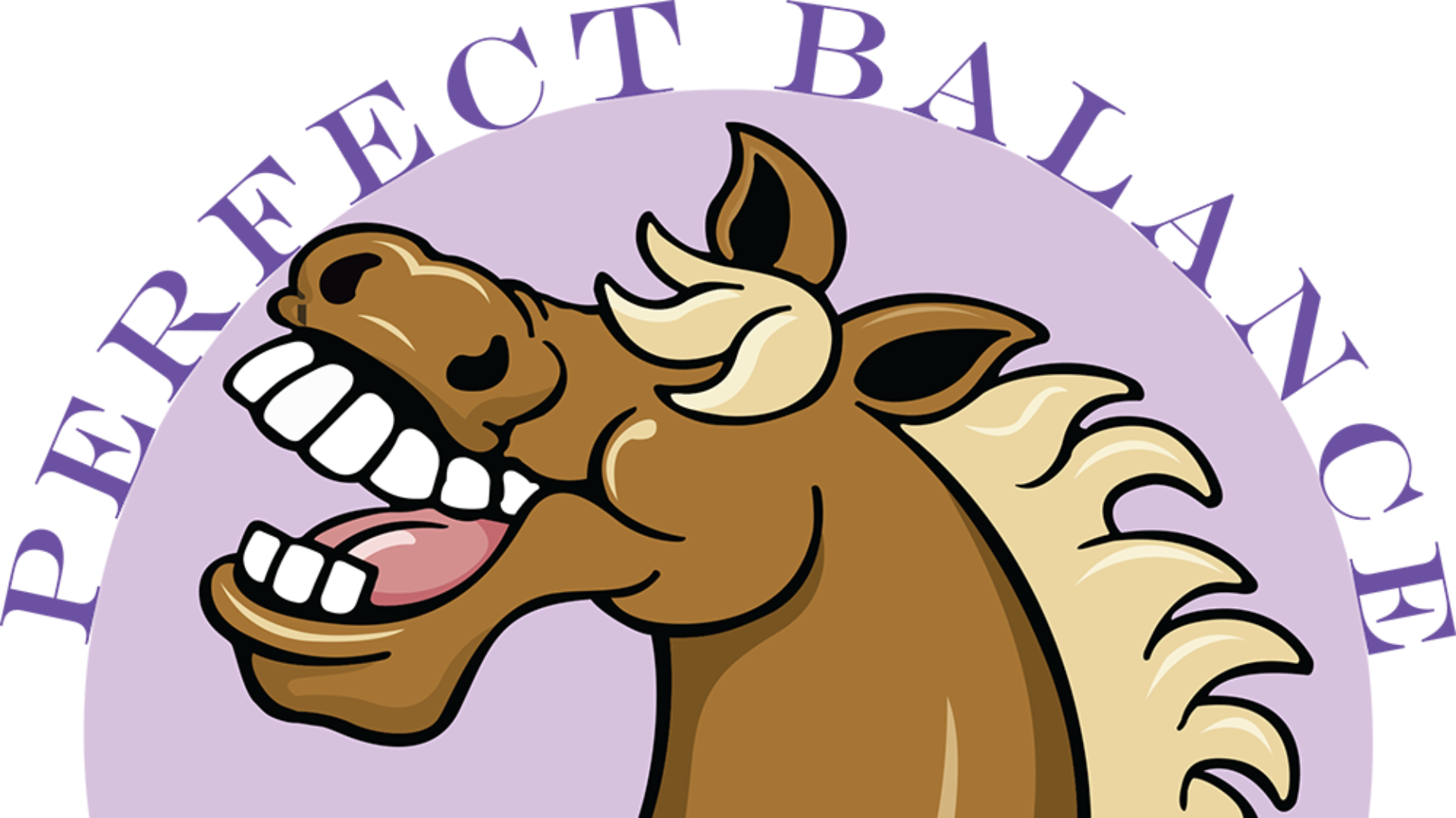Comprehensive Equine Dental Care and Extractions
Specializing in total mouth equilibration: total mouth balancing. A “Perfect Balance” for the whole mouth to work in harmony. Give your horse something to smile about: a great set of teeth! Advantages of proper equine dental care are endless and routine maintenance is essential.
A horse's mouth can impact physical soundness, digestion and many areas of overall health and performance ability. Perfect Balance Equine Dentistry is here to help you and your horse understand the importance of dental health and improve your horse's well being.
Equine Dental Services
- Servicing all sizes and breeds, from Dwarf to Draft breed
- Specializing in total mouth equilibration (total mouth balancing, a “Perfect Balance” for the whole mouth to work in harmony)
- Comprehensive oral exams
- Client education
- Standard and Advanced dental care
- Periodontal treatments
- Geriatric dental care
- Routine and Advanced Dental Floating and Equilibration for all ages and breeds
- Advance imaging: Oral endoscopy, digital radiology
- Minimally invasive oral surgeries and extractions
- Minimally invasive sinus surgeries and treatment of dental related sinus issues
- Trans-buccal extraction technique
Equine Dentistry FAQs
Does every horse need an equine dentist?
 Every horse can benefit from a properly maintained and balanced mouth. A well maintained mouth from the time a horse is young, will not only prevent potential problems in your horses later years, but will maximize the longevity of your horses' dentition, equating in as many years as possible with your equine companion.
Every horse can benefit from a properly maintained and balanced mouth. A well maintained mouth from the time a horse is young, will not only prevent potential problems in your horses later years, but will maximize the longevity of your horses' dentition, equating in as many years as possible with your equine companion.
Current research shows that equine teeth which function normally and have normal wear patterns actually wear more slowly and therefore last longer! This means that the better a horse's teeth are maintained, the longer into his geriatric years his teeth will remain effective for grinding long stemmed roughage, the staple of the equine diet.
At the other end of the spectrum, are horses that have not had proper dental maintenance throughout their life and now have advanced dental issues. A properly trained and certified equine dental practitioner should be able to address these issues to help the horse get greatest functionality possible from its teeth.
A properly maintained mouth will help your horse get the maximum utilization from its feed. This can help the owners pocket book by cutting feed costs by up to 30%!
The knowledge, techniques, and equipment required to perform a thorough dental exam, make a proper diagnosis, perform corrections and treatments are difficult to acquire and time consuming to master. Just as specialization is becoming more and more common in human medicine, so too is it in the equine field.
What should I expect when Dr. Aguel examines my horse?
The dental exam is a relativity quick exam. What Dr. Aguel is looking for is the functionality of your horses mouth in it's current condition. She checks to see if your horse can properly grind its feed, and if it has full range of motion, not only with its mouth, but with its head and neck. The horse’s dentition effects the way the horse breaks at its poll, and its ability to turn right and left.
She then checks your horses temporomandibular joint and stylohyoid and hyoid process for soreness. This also tells her about what is going on inside of your horses mouth. Next she looks at your horses musculature. She looks at the balance and symmetry of the temporalis and masseter muscles. Is there symmetry from one side of your horses head to the next? All these things are indicators of what is happening as your horse is masticating (chewing) its food. If your horse is having trouble eating, she may want to watch them as they are chewing their food.
Dr. Aguel will then begin her oral exam. She will feel along the inside of your horses teeth to feel for any sharp points that may be causing ulceration to your horses cheeks or tongue, or general discomfort. She feels for any dental abnormalities, retained baby teeth (caps), and check the balance of your horses mouth. She will also palpates the first upper tooth (the first premolar) on either side of your horses mouth to look for a “bitseat”. A bitseat helps not only with bit placement and comfort in your horses mouth, but helps the horse to load its feed easily into the dental arcade for chewing.
After the initial exam, if your horse needs dental care, you can either schedule an appointment or if you already have an appointment, you can then expect the following:
What should I expect with the dental procedure?
Dr. Aguel will perform an initial dental exam followed by a brief general physical exam and will discuss any significant medical history or current health concerns with you before she begins.
Dr. Aguel will then sedate your horse with a safe and effective combination of intravenous anesthetics. They will get very groggy, may sway a bit or even stumble once or twice. This is all normal and desirable. The vast majority of horses stand quite well with the combination of drugs administered for this procedure. It is EXTREMELY rare for a horse to lose his balance and fall. Once the horse has reached the desired plane of anesthesia your horse is ready to safely and comfortably begin its dental treatment.
She will apply an instrument called a full mouth speculum. This instrument holds your horse's mouth open safely and without pain. With it, she can see and feel all the way to the back of the mouth. Once she has made her initial visual assessment of your horses mouth, she may then let the owner look or feel the inside of their mouth, so that they too can gain an education about their horses dentition. She tries to keep the clients informed of the corrective measure she will take in their horses mouth, and what to expect in the future for their horse’s dental care.
Dr. Aguels' handling technique allows her to work with your horse safely and efficiently without assistance. It is safest for you to be outside the stall. This way you can watch her work as it progresses. She can use a combination of motorized and hand tools to best address your horse's needs. Her motorized equipment include TISSUE FRIENDLY diamond chip rotary instruments. Her broad selection of instruments allows her pin point accuracy. She can address each portion of each tooth individually as she works to make the whole mouth a smoothly functioning unit.
If you have a concern about motorized equipment, Dr. Aguel asks that you allow her to have a discussion with you on those issues, prior to your horses dental procedure.
When her work is complete, most patients are beginning to emerge from the sedation. Most of her patients are ready to move as soon as she completes the work and most can be loaded into a trailer within 20 minutes. Many owners are concerned about hauling a horse that has been recently sedated. There is no danger in hauling a horse short distances with a little residual sedation. Please make sure there is no hay in the trailer or they may choke, or colic. A horse should not be allowed to eat for approximately 2 hours after sedation.
You will receive a detailed chart outlining your horse's mouth before and after the corrections, a discussion of the procedures, a list of recommendations, and a summary of charges.
Fees and Payment:
The cost varies significantly from horse to horse based on the necessary treatments for each individual. Standard dental care includes dental exam, full mouth equilibration (complete mouth balancing), basic incisor reduction or realignment, canine cutting and buffing, and installation of a bitseat. Prices may vary for advanced dental procedures, geriatric procedures, periodontal issues, etc.
Payment is required at the time of service unless other arrangements have been made IN ADVANCE. We accept cash, checks, and credit cards.
How long does the procedure take?
It varies from horse to horse, but in general, about 45 minutes per horse is necessary. Horses with serious abnormalities, those who are extremely resistant, or those requiring additional diagnostics will take longer. Dr. Aguel is very careful to let the horse periodically rest during long procedures. It is not safe to keep the mouth open wide for long periods of time without a break.
How often does a horse need a dental examination?
Following a horse's first thorough examination and correction, the majority will require annual follow-ups to maintain his/her mouth in optimum functioning order. A few will require more frequent attention, rarely more than every six months. A horse requiring major initial corrections may be best served if the work is broken into two or three sessions a few months apart. Some performance horses will appreciate touch-ups every 6-9 months to keep them comfortable. Horses under the age of 5 benefit from examination every 6-9 months because their teeth are erupting faster than a mature horse and their mouths are undergoing fast and dramatic change as they acquire their permanent teeth.
Is sedation really necessary?
Yes. Leaders in the field agree that it is not possible to perform a thorough examination and correction without substantial sedation. While most procedures are not painful, even routine work is cause for apprehension for most horses. The sedation is extremely safe and allows him/her to relax so that the work can be done correctly, efficiently and without undue stress to the horse.
What can I expect after the procedure?
 Your horse can get in a trailer and haul for short distances (less than 3 hours) within about 30 minutes of completing routine work. Horses should not be ridden after sedation. Under most circumstances, horses may be ridden as normal the following day. Your horse should not eat hay or grain for at least 2-3 hours after a sedation and dental procedure. Once they are fully awake, most horses never miss a meal. A few horses seem to be sensitive to even minute changes in their mouths, even if the changes are for the better. These patients may require a day or two to adjust to their new bite. Dr. Aguel is available and happy to address any concerns at any time following the procedure. Your copy of the dental chart has a description of what is and is not normal after routine dental work. Please read it over and ask any questions at the time of the exam.
Your horse can get in a trailer and haul for short distances (less than 3 hours) within about 30 minutes of completing routine work. Horses should not be ridden after sedation. Under most circumstances, horses may be ridden as normal the following day. Your horse should not eat hay or grain for at least 2-3 hours after a sedation and dental procedure. Once they are fully awake, most horses never miss a meal. A few horses seem to be sensitive to even minute changes in their mouths, even if the changes are for the better. These patients may require a day or two to adjust to their new bite. Dr. Aguel is available and happy to address any concerns at any time following the procedure. Your copy of the dental chart has a description of what is and is not normal after routine dental work. Please read it over and ask any questions at the time of the exam.
What kind of facilities will you need in order to care for my horse(s)?
Most of the time, Dr. Aguel works in a stall with her equipment in the aisle way. She prefers not to work in wash stalls or grooming areas as they can be dangerous for sedated horses. Shed row type barns can work well if the overhang is large and slopes downward. She also needs access to a power outlet. She can also work outdoors, if there is a gate with a bow that goes over head for her dental halter.
Her lighting needs are minimal. Actually, it is easier for me to work in low lighting than bright sunlight. She comes equipped with her own headlamp.
Why is a standing extraction better than under general anesthesia?
Extractions done under general anesthesia are typically procedures that are used for the extraction of premolars and molars. This procedure involves using a long rod to punch (or trephine) the tooth through a hole made in the outer skull of the horse, through the sinus and into the oral cavity. This is NOT the best way to extract a tooth. There are a lot of complications involved with this procedure. Extensive damage is done to the sinus that usually results in long lasting airway infections, and damage to the nasal turbinates. There is also risk when a horse is laid down with general anesthesia in injury upon recovery.
The best and most modern way to extract premolars and molars is using an intraoral technique, with the horse standing. This results in very little complications, because no damage is done to the sinuses. The tooth is extracted from within the mouth, just as it is in human dentist. Nerve blocks are used as well as standing sedation to ensure the horse is kept as comfortable as possible during the procedure.
"A perfect horse deserves a perfect set of teeth."
Contact Your Veterinarian
Give Us a Call
480-389-5709
Service Area
Veterinary and dental visits are by appointments only. Dr. Aguel DOES NOT offer emergency services at this time.
Dr. Aguel (formerly Dr. Echols) is located in Phoenix, AZ and travels throughout the state of Arizona, including Apache Junction, Avondale, Buckeye, Carefree, Cave Creek, Chandler, El Mirage, Fountain Hills, Gilbert, Glendale, Goodyear, Litchfield Park, Mesa, Paradise Valley, Peoria, Phoenix, Queen Creek, Scottsdale, Sun City, Sun City West, Surprise, Tempe, Wickenburg, Tucson, Peoria, Prescott.. Several times a year, Dr. Aguel travels to Texas, Nevada and California. Please give us a call to schedule your barn at 480-389-5709.

